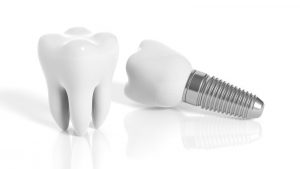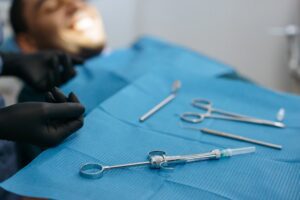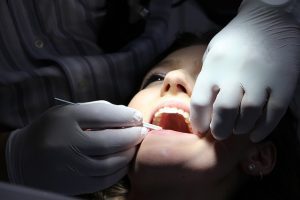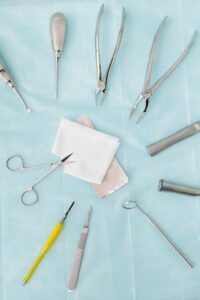Oral lesions are gross. They’re a sign of big health problems in your mouth, but more often than not they’re also a signal that something else in the body is wrong, too. There are a thesis’ worth of types of oral lesions, everything from slightly swollen glands to red, velvety spots inside your cheek. They can present in various shapes, sizes, colors and textures.
Types of Oral Lesions
By far, the most common type of mouth-related lesion is a canker sore; we all know (or are) someone who’s had a canker sore. They’re common and, so long as they heal on their own, nothing to worry about. However, canker sores that refuse to heal are sometimes a sign of an oral or skin cancer. If you get any kind of mouth lesion and it takes longer than 2 weeks to heal, go see your oral surgeon immediately.
The other 3 most common kinds of oral lesions we see are:
- Cold sores: A symptom of the herpes simplex virus, cold sores can be a lifelong issue, and they’re super contagious when they’re open. Obviously, the word “herpes” is scary, but this version of the virus isn’t the one that causes genital lesions and, in fact, about 70% of the world’s population has it in their system.
- HPV virus: These lesions are nearly indistinguishable from warts, except they’re inside your mouth, so you know it’s a problem. HPV is extremely contagious and can be passed in utero. Most of the time, HPV will go away on its own in a year or two, but these lesions carry real risks of developing into esophageal cancer, so make sure they’re monitored by a dentist or oral surgeon.
- Linea alba: Anyone who chews their cheeks or grinds their teeth has likely had these. When you pull your cheek back and look at the lining, you’ll see white lines – this is damaged tissue from the trauma of biting or grinding too much. A simple mouth guard and stress management can often eradicate these.
Causes of Oral Lesions
An oral lesion is defined as an ulcer in the mucous membrane of your gums. Some are very common; others are rare. Sometimes they’ll appear as missing surface tissue, and if they progress they can cause tissue necrosis.
There are a tonne of things that could cause lesions to appear in your mouth, the most common causes being:
- Anemia
- Any manner of infection
- Autoimmune conditions like Crohn’s, lupus or lichen planus
- Cancer treatments
- Physical trauma
- Skin conditions like herpes
- Stress
- Vitamin deficiencies, especially B12 and folic acid
A lesion is considered minor if it’s less than 5mm across and is part of a group of less than 5. A lesion is considered major if it’s more than 10mm in diameter and is part of a group of more than 5. Major lesions are also going to cause deeper craters from tissue depth and tend to happen in short cycles that don’t allow them to heal all the way.
Symptoms of Mouth Lesions
There are so many different kinds, colors, sizes and causes of oral lesions that symptoms can vary depending on each factor. However, common warning signs to look out for are:
- Blisters or sores
- Growths
- Hairy tongue
- Injuries
- Painful area on the gums
- Ulcers or patches without skin
There are a few more concerning symptoms that can signal the presence of cancer:
- Boney bumps on the roof of the mouth
- Hoarseness/pain when speaking
- Lump(s) in throat, neck or mouth
- Oral lesions on tongue or floor of mouth
- Pain/trouble chewing and swallowing
- Slow to no healing
If you see any growths or changes in your mouth, it’s never a bad idea to schedule an appointment with your dentist. Better safe than sorry.
Diagnosing & Treating Oral Lesions
Diagnosing oral lesions is sometimes simple; every oral health professional knows certain types by sight – especially canker sores, cold sores, and lesions that are from bacterial, fungal or viral infections. However, more evasive lesions require clinical diagnosis. This will usually be in the form of biopsies, blood and liver panels, and testing for autoimmune diseases, HIV and HPV.
Treatment for lesions of the mouth, so long as they aren’t a symptom of cancer or another chronic issues, are topical treatments like gels and mouth rinses, oral antibiotics, oral antivirals, and tobacco cessation. For health conditions that cause chronic mouth lesions, there are medications and gels to help prevent new lesions, but as the disease is a whole-body issue, there’s no way to completely cure mouth lesions of this nature.
Preventing Mouth Lesions
It might sound old hat, but it’s good advice nonetheless: keep up with your regular dentist appointments and get in touch with your go-to oral care pro right away when you notice something is off. Good oral health – actually, good health in general – is about listening to your body and treating it right, because prevention is better than mitigation.
So if you’ve noticed a weird bump, swelling, or colorful patch in your mouth or throat, don’t ignore it. What’s bad about going to see your dentist an extra time? It’s a good excuse to get a professional cleaning while you’re in there.










